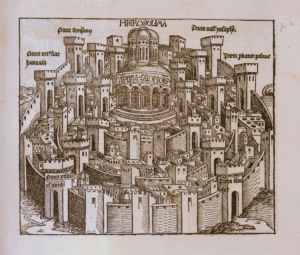TOGGLE COLUMNS (on/off):ADJUST COLUMN POSITIONS: select the column header cell and drag it where you want. show me!COPY INDIVIDUAL COLUMN(S): use CopyTables, a browser extension.
| Source (Hebrew) | Translation (English) |
|---|---|
אֱלִי צִיּוֹן וְעָרֶֽיהָ, כְּמוֹ אִשָּׁה בְּצִירֶֽיהָ, וְכִבְתוּלָה חֲגֽוּרַת־שַׂק, עַל בַּֽעַל נְעוּרֶֽיהָ |
Mourn Zion and her cities, like a woman in her birth pains, And like a maiden wrapped in sack-cloth for the husband of her youth |
עֲלֵי אַרְמוֹן אֲשֶׁר נֻטַּשׁ, בְּאַשְׁמַת צֹאן עֲדָרֶֽיהָ, וְעַל בִּיאַת מְחָרְפֵי אֵל, בְּתוֹךְ מִקְדַּשׁ חֲדָרֶֽיהָ. עֲלֵי גָלוּת מְשָֽׁרְתֵי אֵל, נְעִימֵי שִׁיר זְמָרֶֽיהָ, וְעַל דָּמָם אֲשֶׁר שֻׁפַּךְ כְּמוֹ מֵימֵי יְאוֹרֶֽיהָ. |
Mourn the palace that was abandoned in the sheep’s negligence of its flock, and for the coming of the revulsion of God within the Temple’s rooms. For the exile of the servants of God, who sing her songs, and for their blood that was spilled like the waters of her rivers. |
עֲלֵי הֶגְיוֹן מְחוֹלֶֽיהָ, אֲשֶׁר דָּמַם בְּעָרֶֽיהָ, וְעַל וַֽעַד אֲשֶׁר שָׁמַם וּבִטּוּל סַנְהֶדְרֶֽיהָ. עֲלֵי זִבְחֵי תְמִידֶֽיהָ וּפִדְיוֹנֵי בְּכוֹרֶֽיהָ, וְעַל חִלּוּל כְּלֵי הֵיכָל וּמִזְבֵּֽחַ קְטוֹרֶֽיהָ. |
For the chatter of her dancers which was silenced in her cities, and for the gathering that destroyed and canceled her Sanhedrin. For the periodic sacrifices and redemption of her firstborns, and for the desecration of the vessels of Temple and the altar of her incense. |
עֲלֵי טַפֵּי מְלָכֶֽיהָ בְּנֵי דָוִד גְּבִירֶֽיהָ, וְעַל יׇפְיָם אֲשֶׁר חָשַׁךְ בְּעֵת סָֽרוּ כְּתָרֶֽיהָ. עֲלֵי כָבוֹד אֲשֶׁר גָּלָה בְּעֵת חׇרְבַּן דְּבִירֶֽיהָ, וְעַל לוֹחֵץ אֲשֶׁר לָחַץ וְשָׂם שַׂקִּים חֲגוֹרֶֽיהָ. |
For the children of her kings, sons of David her hero, and for their beauty that was darkened at the time of the removal of her crowns. For the glory that was bared at the destruction of her holiest places, and for the pressure that was caused and placed sack-cloths around her bodies. |
עֲלֵי מַֽחַץ וְרֹב מַכּוֹת אֲשֶׁר הֻכּוּ נְזִירֶֽיהָ, וְעַל נִפּוּץ אֱלֵי סֶֽלַע עֲוִילֶֽיהָ נְעָרֶֽיהָ. עֲלֵי שִׂמְחַת מְשַׂנְאֶֽיהָ בְּשׇׂחְקָם עַל שְׁבָרֶֽיהָ, וְעַל עִנּוּי בְּנֵי חוֹרִין נְדִיבֶֽיהָ טְהוֹרֶֽיהָ. |
For the striking and many blows by which her ascetics were struck, and for the clubbing on the rock of her young children. For the joy of her haters in their laughter on her breaking, And for the affliction of her freemen and her pure princes. |
עֲלֵי פֶֽשַׁע אֲשֶׁר עָֽוְתָה סְלוֹל דֶּֽרֶךְ אֲשׁוּרֶֽיהָ, וְעַל צִבְאוֹת קְהָלֶֽיהָ שְׁזוּפֶֽיהָ שְׁחוֹרֶֽיהָ. עֲלֵי קוֹלוֹת מְחׇרְפֶֽיהָ בְּעֵת רַֽבּוּ פְגָרֶֽיהָ, וְעַל רִגְשַׁת מְגַדְפֶֽיהָ בְּתוֹךְ מִשְׁכַּן חֲצֵרֶֽיהָ. |
For the sins that she committed, making the ways of the wealthy lewd, And for the hosts of her congregations, her blackened and tarnished ones. For the voices of her scorners at the time of her increasing dead bodies, And for the noise of her cursers within the sanctuary of her courtyards. |
עֲלֵי שִׁמְךָ אֲשֶׁר חֻלַּל בְּפִי קָמֵי מְצֵרֶֽיהָ, וְעַל תַּֽחַן יְצַוְּחוּ לָךְ קְשׁוֹב וּשְׁמַע אֲמָרֶֽיהָ. |
For Your name which was desecrated in the mouths of those who stood up against her distressed ones, and for the supplication they will cry out to you, give attention and hear her speech. |
One of the most well-known of the kinot (liturgical poems for mourning), Eli Tsiyon v’Areha is an alphabetical acrostic describing the destruction of Jerusalem. It is recited towards the conclusion of ḳinot, due to the hopeful note in the comparison of Zion to a woman about to give birth, thought by many to be a messianic reference. The author of the work is unknown.

“אֱלִי צִיּוֹן וְעָרֶיהָ | Eli Tsiyon v’Areha (Mourn Zion and her cities), a ḳinnah for Tishah b’Av” is shared through the Open Siddur Project with a Creative Commons Attribution-ShareAlike 4.0 International copyleft license.










Comments, Corrections, and Queries